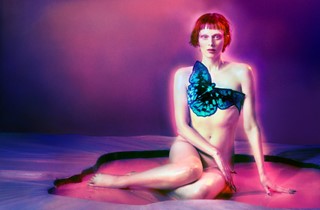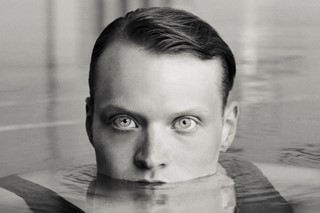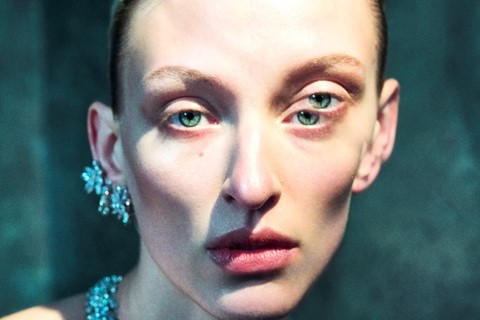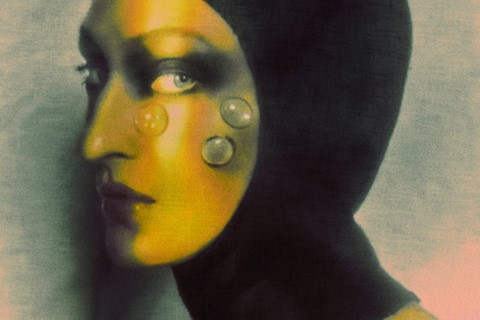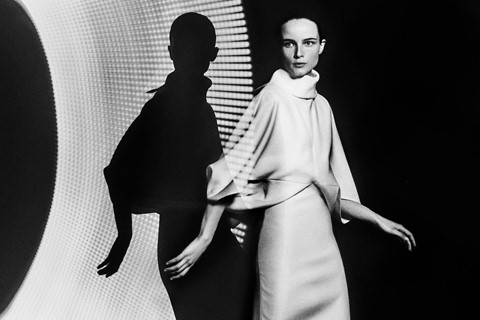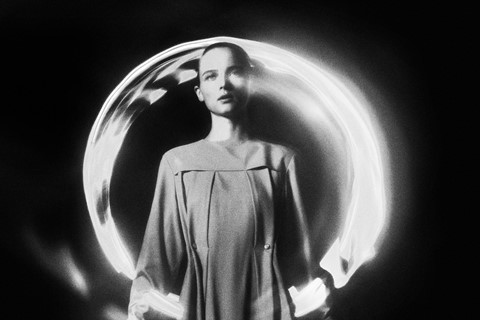Photographer and AnOther contributor Elizaveta Porodina delves into her debut photo book and why she’s so intent on revealing the “stranger side” of people through her work
Elizaveta Porodina’s photographic world is one of intensity. Stylistically reminiscent of fashion photography greats like Sarah Moon or Paolo Roversi, Porodina conjures inky, evocative scenes which tap into the visual pull of archetypes – such as the mother or heroine. Her dreamlike work also investigates surrealist themes – nodding to 20th-century artists like Alexander Rodchenko, Man Ray, and František Drtikol – while possessing a freshness that has attracted leading fashion magazines like Vogue, Dazed, and AnOther. (She shot a Swarovski crystal-encrusted cover for our latest issue, which was styled by AnOther’s fashion director Katie Shillingford.) Launching this month, Porodina’s debut book UN/MASKED presents a survey of the past three years of her work, compiled over 160 vivid pages.
Born in Moscow, Porodina’s journey to becoming a fashion photographer was anything but typical. After leaving school, she trained as a clinical psychologist for seven years, later becoming a psychotherapist at an eating disorder hospital in Germany. “I went from a child who painted pictures to a teenager who was deeply lost, and didn’t know what to do with herself, to someone who loved psychology, but didn’t love it as much as art,” she tells AnOther of the decision to circle back to the creativity of her youth. “I just decided to take a leap and see what happens if I do art and photography full time.” Though Porodina’s background in psychology doesn’t directly influence her photography, a fascination with human behaviour and emotion is evident in her images, which range in mood from soft and ethereal to forceful and haunting.
Porodina’s book arrives as the devastation of war deepens in Ukraine – something, as a Russian-born creative, she has felt compelled to speak out about since the first invasion back in February. “Being a Russian Jew, and a political refugee of the Russian dictatorial regime since the age of 12, has irreversibly shaped my understanding of the world,” she says. “I find it crucial to say how shocked, disgusted, angered and deeply saddened I am over the blatant lies, propaganda and the countless atrocious war crimes the Russian government has been committing. We all are obliged to inform ourselves profoundly and stand up in all ways accessible by putting pressure on our governments, helping the Ukrainian military, and donating to trusted Ukrainian support organisations.”
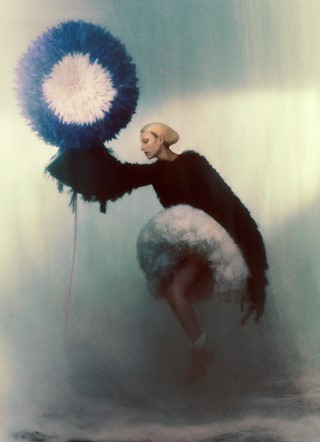
The idea for the book was sparked last year when Fotografiska gallery approached Porodina about a hosting a solo exhibition of her work, which is currently on view in Stockholm. “While I was [curating the show], I realised I knew exactly what the book would look like,” she remembers. “It was really like a powerful wave.” The book, says the artist, examines the way we present ourselves to others and the many aspects of our personalities we hide away. “It’s about the personas that we put on, and the masks and the layers that we are creating to make other people’s, or our own experiences of life, easier and more graspable for ourselves,” she explains. “Underneath that, there are so many weird, strange, dark, uncovered, unmasked levels that are so hard to express with language – and this is what I wanted to show in pictures.”
This subject, Porodina says, circles back to her principal fascination with archetypes: “I want to show a heroine; I want to show a mother; I want to show a god; I want to show a harlequin; I want to show a shadow. Something forceful and general, dark, strange and powerful that is literally going to bounce with this light or darkness from the picture, and will speak to the viewer directly about their fears, about their dreams.” Through employing these archetypes, Porodina hopes to tap into an innate human need for meaning and identification. “Just like spiders know how to do their webs right from the beginning, without being told how to, people have these inner pictures within them. It’s a powerful source of communication.”
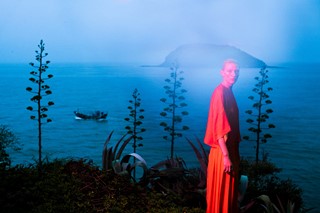
With such a cerebral driving force behind her work, it makes sense that Porodina’s artistic heroes – “people who keep me going,” she says – have all danced the line between beauty and darkness in their careers: Francis Bacon, David Bowie, and Swedish documentary-photographer, Anders Petersen. One image in the book which Porodina feels represents her as an artist most closely is a dramatic portrait of make-up artist Cécile Paravina, pale-faced with red hair, grinning with a sinister flash of lipstick-smeared teeth. “We have a very special connection; she’s Serbian, and my roots are in Russia, so we have this Slavic, dark connection to each other,” she says of her bond with Paravina. “When I photographed it, I just felt how powerful it was – she said I managed to photograph her soul and her true inner expression. I felt the same about me. When I look at this picture, it’s not only her that I see, it’s also me. It has a little funny, tragic aspect to it – the way I always see life with a smile but there’s always drama, too.”
The book, says Porodina, is dedicated to this “stranger side” in all of us. “To quote the Nightcall song from the movie Drive, ‘There’s something inside you that I cannot explain,’” she says. “It’s dedicated to that; to that uncovered colour in your kaleidoscope.”
UN/MASKED is published by Hatje Cantz Verlag GmbH and is available for pre-order now.
This article was updated on May 6, 2022.
